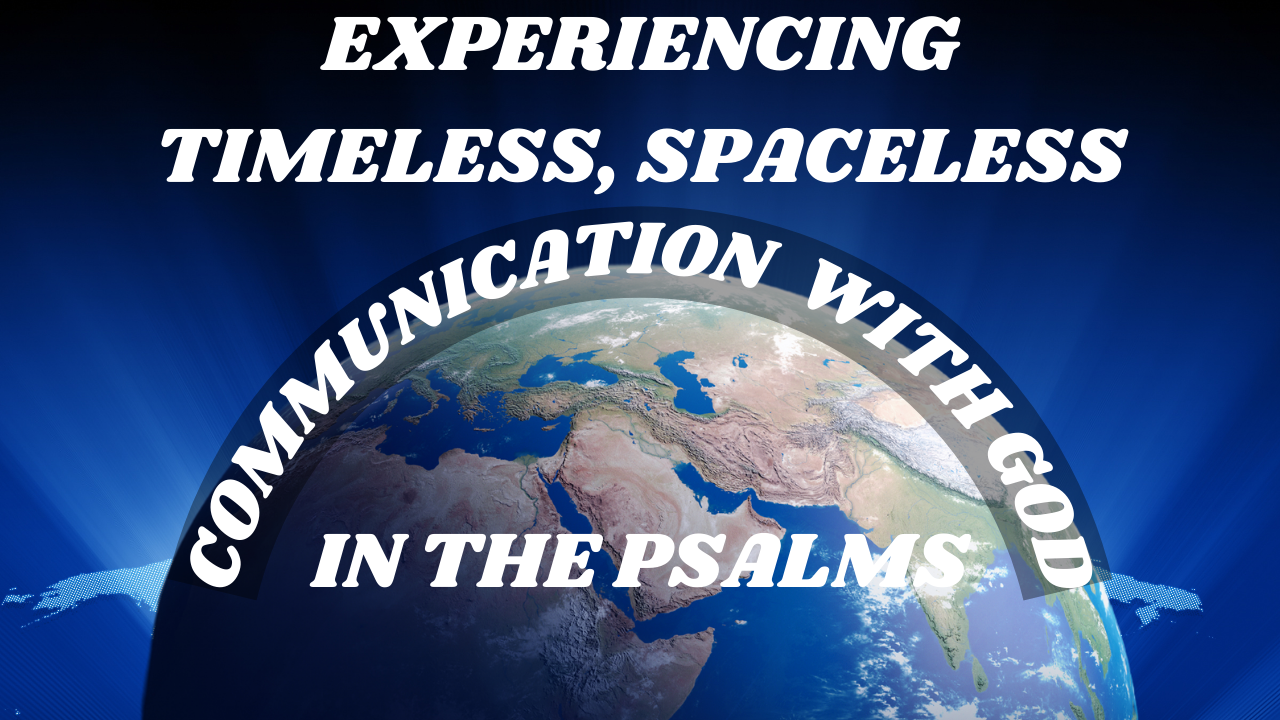Psalms (Lesson 1) How to Read the Psalms Day 1-3
EXPERIENCING TIMELESS, SPACELESS COMMUNICATION WITH GOD IN THE PSALMS
Filled with divine inspiration, the Psalms stand as God’s timeless and spaceless communication with humanity. Though written thousands of years ago, they are still relevant. What do they say to us?
We are venturing on a new journey, a journey through the Psalms.
With no match, the Psalms are prayers and hymns snugged within the heart of the Bible.
Bursting forth in praise, exultation, sorrow, and sometimes hearts of desperation, these sacred verses have been echoed in private prayer closets and in public spaces alike.
The Psalms have been expressed on the lips of people from every walk of life, from the person standing on the street corner to top leading officials.
Psalms are a chorus that transcends time and space.
As we journey through the Psalms, may they be a guiding light to lead you into a deeper relationship with God.
Review our past and present videos at SabbathSchoolDaily.com or visit my YouTube Channel,
Sabbath School Daily by Dr. Brenda Ware Davis
Inviting God’s Presence:
Father, as we take this intimate journey through the Psalms with you, let it not be just a fleeting moment that we soon forget. Let it be a constant pulsation that shapes our each new day. In Jesus’ Name, Amen.
Psalms
(Lesson 1)
How to Read the Psalms
Day 1
The Psalms are prayers and hymns that echo down through the ages, resonating in the hearts of both Jews and Christians.
Beyond being mere mortal words, the Psalms have Divine origin. They are inspired by the very hand of God, who stirred the thoughts that found expression on the sacred pages of the Bible.
As 2 Peter 1:21 affirms, within the Psalms, God’s voice reverberates through the words of His devoted servants, guided by the Holy Spirit.
The Psalms is not just poetry; it’s a divine dialogue between God and humanity spanning centuries.
It says in the book The Faith that I Live By:
The Bible points to God as its author, yet it was written by human hands, and in the varied style of its different books, it presents the characteristics of several writers. The truths revealed are all “given by inspiration of God” (2 Timothy 3:16); yet they are expressed in the words of men. The Infinite One, by His Holy Spirit, has shed light into the minds and hearts of His servants. He has given dreams and visions, symbols and figures; and those to whom the truth was thus revealed, have themselves embodied the thought in human language. . . .
God designed the Bible to be a lesson book to all humanity in childhood, youth, and adulthood and to be studied through all time. He gave His Word to humanity as a revelation of Himself. It is the medium of communication between God and humans.—The Faith I Live By, p. 10.
In fact, Jesus Himself, the apostles, and the writers of the New Testament recognized the Psalms as more than ancient verses.
They often referred to them as Scripture, weaving them into the fabric of their teachings and references.
Mark 12:10, John 10:34-35, and John 13:18 bear witness to the authority and sanctity bestowed upon the Psalms, elevating them to the status of the Word of God as various other books of the Bible such as Genesis and Romans.
To unravel the profound wisdom within the Psalms, we must embrace them as God’s living Word.
The Book of Psalms is a collection of Hebrew poetry by different authors from ancient Israel. These poets, in their own words, wrote and composed these prayers and songs to God. Yet they are God-breath.
Therefore, we will need to pay close attention to the Psalms’ poetic features, as well as the context under which it was written For they are the basis for understanding its messages.
This, therefore, demands that we look at its history and teachings. Additionally, it is necessary that we understand how the Israelites used the songs for worship across many generations.
So, what approach should we take to obtain a better understanding of God’s message for us in the Psalms as it relates to us today? To find out, continue to Part 2 of this video, How to Read the Psalms
Psalms
(Lesson 1)
How to Read the Psalms
Day 2 The Psalms in Ancient Israel’s Worship
The Book of Psalms was written for countless reasons, and they have been referenced countless times in other parts of the Bible.
As attested by the following scriptures: 1 Chronicles 16:7; Nehemiah 12:8; Psalm 18:1; Psalm 30:1; Psalm 92:1; Psalm 95:2; Psalm 105:2; Colossians 3:16; and James 5:13.
The Book of Psalms is a collection of poems. Different poets wrote the Book of Psalms.
Their poems are also songs and prayers to God.
The poets wrote their poems for both personal and public worship.
The Israelites sang the poems as hymns to God in His temple.
Many poets included short notes with their poems or songs.
The notes helped guide the music leaders, as noted in Psalm 8:1. They helped the music leader choose which musical instruments they should play, as in Psalm 61:1, or the tune they should use when they sing the song, as in Psalm 9:1.
In the Hebrew language, the title of the Book of Psalms is a Hebrew word that means “praises.”
It shows us the main reason the Psalms were written: to praise God.
Our word “psalms” comes from the Septuagint.
The Septuagint is a copy of the Old Testament written in the Greek language.
The Septuagint was made 200 or 300 years before Jesus was born.
In the Septuagint, the word for “psalms” is written in the Greek language.
The Book of Psalms was an important part of Israel’s worship.
The people of God used it for their temple celebrations, religious feasts, parades, and when the Ark of Promise came to Jerusalem.
For instance, Psalms 120–134 were “The Songs of Ascents”; they were also called pilgrimage songs.
They were traditionally sung during their pilgrimage to the Jerusalem temple to attend the three major annual festivals, as indicated in Exodus 23:14–17.
The people sang Psalms 113–118 and Psalm 136 at the three major festivals.
They sang these songs at the New Moon festivals and when the leaders dedicated the temple to God.
They also took a significant place in the Passover ceremony.
The people sang Psalms 113 and 114 at the start of the Passover meal and Psalms 115–118 at the end, as in Matthew 26:30.
The Passover was a commemoration of the time when God brought Israel out of Egypt.
Psalms 145–150 were part of the daily morning prayers used for worship in the temple.
The Psalms taught God’s people how to worship Him in His temple. Jesus, in Matthew 27:46, prayed with the words from Psalm 22.
Matthew 27:46
46 And about the ninth hour Jesus cried out with a loud voice, saying, “Eli, Eli, lama sabachthani?” that is, “My God, My God, why have You forsaken Me?” (Matthew 27:46)
The New Testament churches also taught and sang from the Book of Psalms, too, as seen in Colossians 3:16 and Ephesians 5:19. (Split)
Colossians 3:16
16 Let the word of Christ dwell in you richly in all wisdom, teaching and admonishing one another in psalms and hymns and spiritual songs, singing with grace in your hearts to the Lord. (Colossians 3:16)
Ephesians 5:19
19 speaking to one another in psalms and hymns and spiritual songs, singing and making melody in your heart to the Lord, (Ephesians 5:19)
Notice here what it says about the value of songs and praise and too much formality in the worship of God.
There is too much formality in our religious services.
The Lord would have His ministers who preach the word energized by His Holy Spirit; and the people who hear should not sit in drowsy indifference, or stare vacantly about, making no responses to what is said. . . .
There should be wide-awake, active churches to encourage and uphold the ministers of Christ and to aid them in the work of saving souls.
Where the church is walking in the light, there will ever be cheerful, hearty responses and words of joyful praise. . . .
”—Testimonies for the Church, vol. 5, p. 318.
Who are the writers of the Book of Psalms?
To find out, continue to the next segment of this video, Part 3, Meet the Psalmist
(Lesson 1)
How to Read the Psalms
Day 3 Meet the Psalmist
King David wrote most of the poems in the Book of Psalms.
His name appears in many of its titles.
David is referred to as “the sweet psalmist of Israel” in 2 Samuel 23:1.
David played an important role in selecting the songs for worship in the temple.
New Testament writers, as in Matthew 22:43–45; Acts 2:25–29, 34, 35; Acts 4:25; Romans 4:6–8, also indicate that David wrote many of the psalms.
Furthermore, many of the psalms were written by the temple musicians, who were Levites:
For instance:
- Asaph wrote Psalm 50 and Psalms 73–83.
- The sons of Korah wrote Psalm 42, Psalms 44–49; Psalm 84; Psalm 85; Psalm 87; and Psalm 88.
- Heman the Ezrahite also wrote Psalm 88. (Split)
- Ethan the Ezrahite wrote Psalm 89.
- Solomon wrote Psalm 72 and Psalm 127.
- Moses wrote Psalm 90.
In reading the following psalms, we see that the authors, inspired by God, wrote from their own experiences.
Psalm 25:1–5; Psalm 42:1; Psalm 75:1; Psalm 77:1; Psalm 84:1, 2; Psalm 88:1–3; and Psalm 89:1.
For example: Psalms 25:1-5 says
1 To You, O Lord, I lift up my soul.
2 O my God, in You I trust, Do not let me be ashamed; Do not let my enemies exult over me.
3 Indeed, none of those who wait for You will be ashamed; Those who deal treacherously without cause will be ashamed.
4 Make me know Your ways, O Lord; Teach me Your paths.
5 Lead me in Your truth and teach me, For You are the God of my salvation; For You I wait all the day. (Psalms 25:1-5)
Psalms 42:1
1 As the deer pants for the water brooks, So my soul pants for You, O God. (Psalms 42:1)
Psalms 75:1
1 We give thanks to You, O God, we give thanks, For Your name is near; Men declare Your wondrous works. (Psalms 75:1)
Psalms 77:1
1 My voice rises to God, and I will cry aloud; My voice rises to God, and He will hear me. (Psalms 77:1)
Psalms 84:1-2
1 How lovely are Your dwelling places, O Lord of hosts!
2 My soul longed and even yearned for the courts of the Lord; My heart and my flesh sing for joy to the living God. (Psalms 84:1-2)
Psalms 88:1-3
1 O Lord, the God of my salvation, I have cried out by day and in the night before You.
2 Let my prayer come before You; Incline Your ear to my cry!
3 For my soul has had enough troubles, And my life has drawn near to Sheol. (Psalms 88:1-3)
Psalms 89:1
1 I will sing of the lovingkindness of the Lord forever; To all generations I will make known Your faithfulness with my mouth. (Psalms 89:1)
Thus, the Holy Spirit inspired these poets, and they used the talents that God gave them to serve Him and their community of faith.
These poets were men with strong faith, and they had a deep love for God.
Yet, like us, at times, they were prone to discouragement and temptation. (Split)
They often had to fight against the lies and traps that Satan laid for them.
So, although these poets wrote their songs and poems long ago, they are relevant today.
They talk about many of the things we experience.
Notice what Psalms 88:2 and 3 say:
“Let my prayer come before You; incline Your ear to my cry. For my soul is full of troubles, and my life draws near to the grave (Psalm 88:2, 3).
Who hasn’t felt this way at times? This is a cry of the twenty-first-century soul just as much as it was of someone living 3,000 years ago.
For sure, someone from our time could have written this cry for help.
Some poems in the Book of Psalms are about joy. Others talk about hardship.
Being honest about their suffering, they cried out to God for help, and they received his undeserved favor.
The poets praised God for His love and faithfulness.
They promised to serve him forever with their whole heart.
Thus, The Book of Psalms is a message about God’s saving love, mercy, and hope.
The Book of Psalms tells of God’s promise to all who embrace, by faith, his gift of love, forgiveness, and a new life.
Interestingly, the psalmist does not try to cover up, hide, or downplay the hardships and sufferings they experience as a result of living in this fallen world.
The point is that even faithful people, like the psalmist, struggle with similar hardships, difficulties, and trials as we do today.
How can we use these psalms to help us when the pressures of life seem to weigh us down? Watch my upcoming video: Part 4: A Song for Every Season
Share your results in the comment section below.
Thank you for watching this video to be notified when my next video comes out, Subscribe to my YouTube Channel, Sabbath School Daily, by Dr. Brenda Ware Davis.
You also may obtain the free guide for this study at Sabbath.School or ssnet.org
If you enjoyed this video and want to make it available for your friends and family to watch, click Like…..then…..Share.
Thank you for Liking, Sharing, and Subscribing.
Hebron Seventh-day Adventist Church
7902 Wheatly Street
Houston, TX 77088
Watch Past and Present Lessons at SabbathSchoolDaily.com














Post Comment